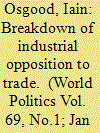| Srl | Item |
| 1 |
ID:
152232


|
|
|
|
|
| Summary/Abstract |
This article documents systematic deviations from standard models of trade politics, each of which has the effect of undermining sustained efforts at coherent industrial opposition to trade. Industries have internal disagreements about liberalization, support for trade liberalization extends bilaterally across borders in the same industry, and comparative disadvantage industries feature convincing expressions of public support for liberalization. These surprising outcomes are explained by a model of trade politics that emphasizes three factors: firm heterogeneity in export performance, product differentiation, and reciprocal liberalization. The author uses a new data set of industry attitudes about fifteen US trade agreements to show that product differentiation is strongly correlated with these outcomes, even conditional on plausible alternatives. The author concludes that public position-taking and lobbying on trade politics have been fundamentally altered by the rise of product variety; trade's opponents and indifferents have been overwhelmed by pro-globalization firms breaking out to support trade on their own.
|
|
|
|
|
|
|
|
|
|
|
|
|
|
|
|
| 2 |
ID:
160341


|
|
|
|
|
| Summary/Abstract |
From 1960 to 2000, manufacturing supply chains became global. To what extent has this growth in offshore outsourcing and foreign direct investment affected industrial attitudes toward trade liberalization? Using data on public positions of US firms and trade associations on all free trade agreements since 1990, I show that foreign direct investment (FDI) and input sourcing are the primary drivers of support for trade liberalization. Direct import competition and export opportunities play a secondary role in shaping support for free trade agreements. This work therefore adds to the literature on the politics of globalization by providing systematic evidence of a link between global supply chains and industrial preferences, and by developing a new model of the determinants of industrial attitudes toward trade.
|
|
|
|
|
|
|
|
|
|
|
|
|
|
|
|
| 3 |
ID:
157360


|
|
|
|
|
| Summary/Abstract |
The firms that compose a typical American industry regularly part ways over trade policy, choosing to lobby or publicly comment on their own rather than collectively via their industry association. Emphasizing the importance of firm heterogeneity in global engagement, I consider the role of multinationalization and global sourcing in generating these disagreements. Each of these explanations for industrial fragmentation is supported with evidence on position-taking and lobbying from all US trade agreements since the North American Free Trade Agreement (NAFTA), as well as lobbying data on all trade policy issues. Variation in ability to benefit from globalization across firms, rather than the collective action problem or firm-specific trade protection, best explains firm-centric patterns of lobbying. These changed patterns of lobbying drive the content and scope of US trade agreements and have altered the trajectory of US trade politics.
|
|
|
|
|
|
|
|
|
|
|
|
|
|
|
|
| 4 |
ID:
175332


|
|
|
|
|
| Summary/Abstract |
Under what circumstances does terrorism repel foreign investment? The negative effect of terrorism on foreign investment identified in current scholarship masks heterogeneity across host markets and industries. Foreign investment ought to react less to political violence when host markets match firms’ input requirements, when firms lack viable alternative hosts, and when assets are immobile across markets. We model the endogenous codetermination of terror and investment to derive these comparative statics, highlighting empirical challenges in identifying the effects of terror on foreign direct investment. To overcome these obstacles, we use an instrumental variable estimator which exploits differences in the networks along which terror and investment spread. Using industry-level data on the activities of US multinationals, we test our model and conclude that foreign investors that find it hard to leave particular host markets are doubly penalized: their lack of outside options makes them tempting targets for terror. Our findings have implications for other forms of violent and nonviolent political tactics which affect multinationals and for understanding how foreign investment reacts to heightened risk in host markets.
|
|
|
|
|
|
|
|
|
|
|
|
|
|
|
|